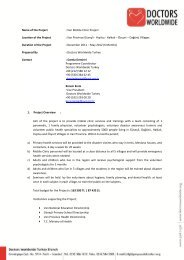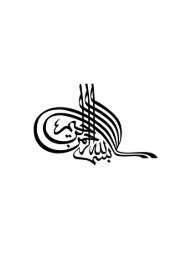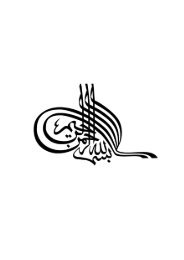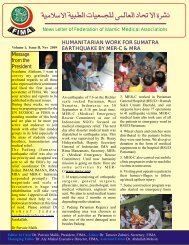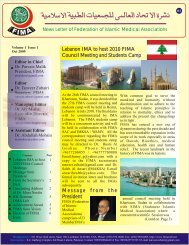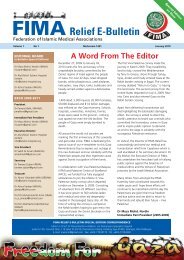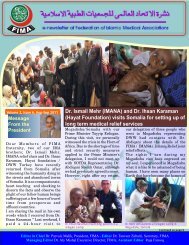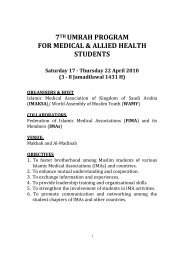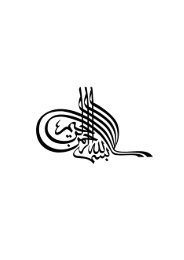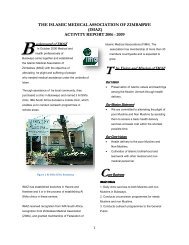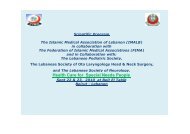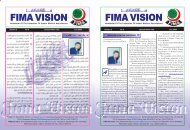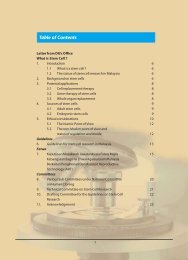FIMA Year Book 2009 - Federation of Islamic Medical Associations
FIMA Year Book 2009 - Federation of Islamic Medical Associations
FIMA Year Book 2009 - Federation of Islamic Medical Associations
You also want an ePaper? Increase the reach of your titles
YUMPU automatically turns print PDFs into web optimized ePapers that Google loves.
Ethics <strong>of</strong> Clinical Researchto prove that the waiver was given trulyvoluntarily. I would think that waiving<strong>of</strong> the right to reparation ought not to bepermitted. In my view, allowing waiverswill make the investigator less careful inavoiding harm to the research subject.Further, I believe there is a differencebetween harm resulting from acceptedtreatment versus that resulting frominvestigational treatment in the course<strong>of</strong> conducting a clinical trial. CIOMSguideline 19 specifically prohibits suchwaivers.Guideline 20. Strengthening Capacityfor Ethical and Scientific Review andBiomedical ResearchIn externally sponsored research,sponsors and investigators have anethical obligation to ensure thatbiomedical research projects forwhich they are responsible in thehost countries contribute effectivelyto national or local capacity to designand conduct biomedical research andto provide scientific and ethical reviewand monitoring <strong>of</strong> such research.Guideline 21. Ethical Obligations <strong>of</strong>External Sponsors to Provide HealthCare ServicesExternal sponsors are ethically obligedto ensure the availability <strong>of</strong> health careservices that are essential to the safeconduct <strong>of</strong> the research and for thetreatment <strong>of</strong> subjects who suffer injuryas a consequence <strong>of</strong> the research as wellas the availability <strong>of</strong> services to makea beneficial intervention developedas a result <strong>of</strong> the research reasonablyavailable to the population.Guidelines 20 and 21 both fall under the<strong>Islamic</strong> principles <strong>of</strong> justice and charityand that <strong>of</strong> reparation previouslydiscussed.Summary <strong>of</strong> the Differences BetweenThe <strong>Islamic</strong> Viewpoint and CIOMSGuidelinesFew differences exist between the twodocuments. A major difference is theimportance that Islam puts on ‘publicinterest.’ It takes precedence overprivate interest in special cases. Thiscontrasts with guideline eight as well aswith the Declaration <strong>of</strong> Helsinki.CIOMS guideline 14 requires theconsent <strong>of</strong> the guardian for a child toparticipate in research study. Under<strong>Islamic</strong> rulings this is also necessarybut the permission <strong>of</strong> the guardianis legitimate under strict conditionsoutlined above. Further, the CIOMSguideline stipulates that the assent <strong>of</strong>the child should be obtained if possible.<strong>Islamic</strong>ally, that is not required. At thesame time, the child’s objection toparticipation in the study is not to beaccepted if the guardian believes thatparticipation is beneficial. On the otherhand, the CIOMS guideline respects achild’s objection to participate.When recruiting a married woman forresearch, it is <strong>Islamic</strong>ally preferable toobtain the husband’s consent. This isnot included in CIOMS guideline 16.When recruiting a pregnant womanfor a research study, if there is anypotential risk to the fetus even whenminimal or outweighed, the husband’sconsent should be obtained according<strong>FIMA</strong> <strong>Year</strong><strong>Book</strong> <strong>2009</strong>150




